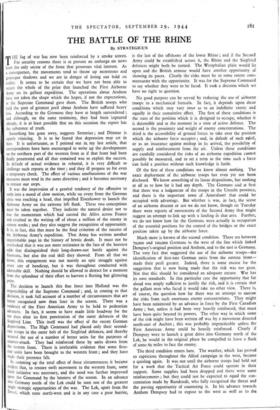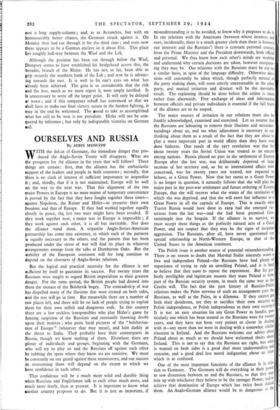THE BATTLE OF THE RHINE
By STRATEGICUS
THE fog of war has now been reinforced by a smoke screen. For security reasons there is at present an embargo on news from the only sector of the front that possesses vital interest. As a consequence, the movements tend to throw up monstrous and grotesque shadows and we are in danger of losing our hold on reality. It seems to be certain that we have not been able to secure the whole of the prize that launched the First Airborne Army on its gallant expedition. The operations about Arnhem have not taken the shape which the hopes, if not the expectations, oc, the Supreme Command gave them. The British troops who held the post of greatest peril about Arnhem have suffered heavy loss. According to the Germans they have at length surrendered ; and although, on the same testimony, they had been 'captured already, it is at least possible that on this occasion the report has the substance of truth.
Something has gone awry, suggests Sertorius ; and Dittmar is openly rejoicing. It is to be feared that depression may set in here. It is unfortunate, as I pointed out in, my last article, that correspondents have been encouraged to write up the developments on the northern part of the western front as if that front had been finally penetrated and all that remained was to exploit the success. In default of actual evidence in rebuttal, it is very difficult to challenge such reports at the time ; and they ill prepare us for even a temporary check. The effect of various ameliorations of the war measures must tend in the same direction ; and it becomes necessary to retrace our steps.
It was the impression of a general tendency of the offensive to settle into a mood of slow motion, while on every front the German crisis was reaching a head, that impelled Eisenhower to launch the Airborne Army on the extreme left flank. These two•conceptions must be taken together. They indicate the natural desire not to lose the momentum which had carried the Allies across France and resulted in the writing off of about a million of the enemy in sixteen weeks ; and they also suggest the recognition of opportunity. It is, in fact, this that must be the final criterion of the success of the Airborne Army's expedition. That Army has written another imperishable page in the history of heroic deeds. It must not be overlooked that it was not mere resistance in the face of the heaviest odds that distinguished their long-drawn-out battle against the Germans,. but also the real skill- they showed. From all that we know, this engagement was not merely an epic struggle against every sort of handicap, but it was throughout conducted with admirable skill. Nothing should be allowed to detract for a moment from the splendour of their effort to harvest a fleeting but glittering prize.
The decision to launch this fine force into Holland was the responsibility of the Supreme Command ; and, in coming to that decision, it took full account of a number of circumstances that are better recognised now than later in the season. There was a tendency of the First American Army to be held to pedestrian advances. In fact, it seems to have made little headway for the ten days after its first penetration of the outer defences of the Siegfried Line. This itself was the effect of the recent German dispositions. The High Command had placed only their second- rate troops in the outer belt of the Siegfried defences, and thereby secured the use of a number of better units for the purposes of counter-attack. They had reinforced these by units drawn from the eastern front. There is irrefutable evidence that some first- tate units have been brought to the western front ; and they have made their presence felt. In summing up the total effect of these circumstances it became evident that, to restore swift movement to the western front, some fresh initiative was necessary, and the need was further impressed 111)0n the Command by the lateness of the season. In an advance into Germany north of the Lek could be seen one of the greatest single strategic opportunities of the war. The Lek, apart from the Ilessels which runs north-west and is in any case a poor barrier,
is the last of the offshoots of the lower Rhine ; and if the Second Army could be established across it, the Rhine and the Siegfried defences might both be turned. The Westphalian plain would lie open and the British armour would have another opportunity of showing its paces. Clearly the risks must be to some extent com- mensurate with the opportunity. It was for the Supreme Command to say whether they were to be faced. It took a decision which we have no right to question.
No good purpose can be served by reducing the use of airborne troops to a mechanical formula. In fact, it depends upon three conditions which may vary inter se to an indefinite extent and equally in their cumulative effect. The first of these conditions is the state of the position which it is designed to occupy, whether it is defensible and at the moment in a state of active defence. The second is the proximity and weight of enemy concentrations. The third is the accessibility of ground forces to take over the position which the airborne force occupies ; and, in default of such relief, or as an insurance against mishap in its arrival, the possibility of supply and reinforcement from the air. Unless these conditions are carefully considered the risks of an airborne expedition cannot possibly be measured, and to set a term to the time such a force can hold a position without such knowledge is futile.
Of the first of these conditions we know almost nothing. The exact deployment of the airborne troops has even yet not been disclosed. We know something of its linear dispositions, but nothing at all as to how far it had any depth. The Germans said at first that there was a lodgement of the troops in the Utrecht province, and there is the important town of Amersfoort that could be occupied with advantage. But whether is was, in fact, the scene of an airborne descent or not we do not know, though on Tuesday there were reports of movements of the Second Army that might suggest an attempt to link up with a landing in that area. Further, we do not know how far the Germans were_actually in occupation of the essential positions for the control of the bridges or the exact position taken up by the airborne force.
Much more is known of the second condition. There are between 70,000 and roo,000 Germans to the west of the line which linked Dempsey's original position and Arnhem, and to the east is Germany. The very fact that suggested the use of the airborne troops—the identification of first-rate German units from the eastern front— made their peril greater. Indeed, there is some excuse for the suggestion that is now being made that the risk was too great. Not that this should be considered an adequate excuse. War has its own standards. In this particular case the opportunity that lay ahead was amply sufficient to justify the risk, and it is certain that the gallant men who faced it would take no other view. There is, of course, the question how far there was an attempt to narrow the risks from such enormous enemy concentrations. They might have been minimised by an advance in force by the First Canadian Army ; but, unless it had been very heavily reinforced, that must have been quite beyond its powers. The other way in which some of the risk might have been written off was by a movement directed north-east of Aachen ; this was probably impracticable unless the First American Army could be heavily reinforced. Clearly if Dempsey were to launch a great drive into Germany north of the Lek, he would in the original phase be compelled to leave a flank of some 6o miles to face the enemy.
The third condition enters here. The weather, which has proved so capricious throughout the Allied campaign in the west, became a quisling again. It was not until the airborne troops had held out for a week that the Tactical Air Force could operate in their support. Some supplies had been dropped and there were soma reinforcements ; but they could not be expected to equal the con- centration made by Rundstedt, who fully recognised the threat and the passing opportunity of countering it In his advance towards Arnhem Dempsey had to expose to the west as well as to tha east a long supply-column ; and, as at Avranches, but with an immeasurably better chance, the Germans struck against it. On Monday they had cut through it for the third time ; and even now there appears to be a German enclave in it about Elst. This place lies roughly half-way between the Waal and the Lck.
Although the position has been cut through below the Waal, Dempsey seems to have established his bridgehead across this, the broader, branch of the Rhine. He has not, so far, been able to grip securely the southern bank of the Lek ; and now he is advanc- ing towards the east. It is well to fix one's eyes on what has already been achieved. The gain is so considerable that the risk and the loss, much as we must regret it, were amply justified. It Is unnecessary to write off the larger prize. It will only be delayed at worst ; and if this temporary rebuff has convinced us that we shall have to make our final victory secure in the hardest fighting, it may in the end be welcomed. The rood to take as accomplished what has still to be won is too prevalent. Hitler will not be con- quered by inference ; but only by indisputable victories on German soil.



























 Previous page
Previous page